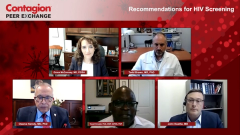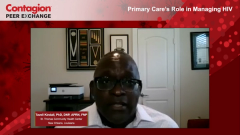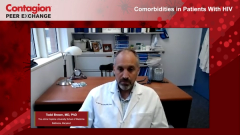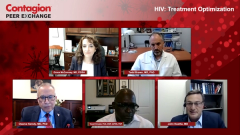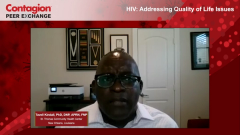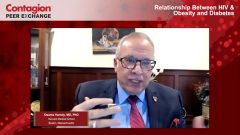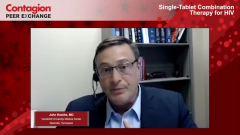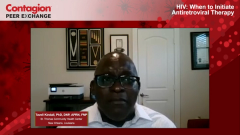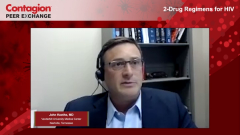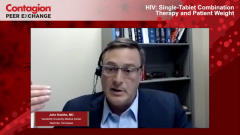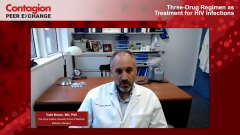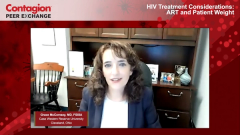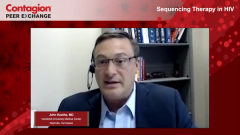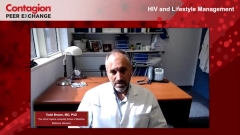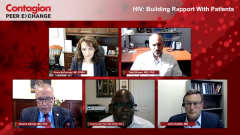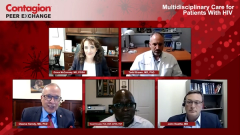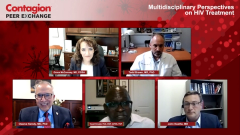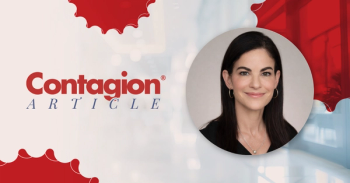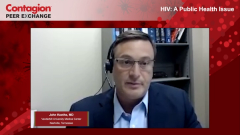
Multidisciplinary Perspectives on HIV Treatment
A multidisciplinary panel concludes a discussion on best practices for managing patients with HIV in various healthcare settings and overcoming social health disparities.
Episodes in this series

Grace McComsey, MD, FIDSA: I want to thank all of you. It was [a] very informative discussion. And before we conclude, let me get your final thoughts, if there’s anything that you thought about that didn’t come up in the discussion. John, you want to start?
John Koethe, MD: Sure. To a certain extent, we are dealing with the consequences of our own success. We don’t want to lose sight of the fact that now that we’re coming up on going into the fifth decade of HIV if we think about [it] in that way, we have tremendously effective drugs. People are now surviving decades. They’re doing quite well. And we’re just shifting gears and we’re starting now to tweak things around the edges to improve that quality of life, and to not only keep people alive but keep them healthy. This is an important conversation that we had today. I’ve spent much of my career and continue to sort of working in the area of weight gain, and I still don’t fully understand it. But I do see it as sort of the thin edge of the wedge that then leads to a lot of other downstream problems for our patients.
It’s an area that sometimes we have a hard time addressing because we don’t understand what to do about it. But it’s an area that patients appreciate when we open up and ask them about it. It’s an exciting area, and we should take the data that we already have but keep an eye out over the next 2 years for when we start to learn more about what are the causes of this weight gain or what the consequences are and what we might be able to do about it down the road. Once we begin to wrap our mind around that, then we’ll begin probably to unlock some of these questions regarding cardiovascular disease, metabolic disease, and some of the other complications.
Grace McComsey, MD, FIDSA: Perfect. Thank you, John. Todd, any final thought?
Todd Brown, MD, PhD: Yes. This issue of quality of life is critical. Comorbidities is critical but taking the long view as I mentioned before on the aging process is what we need to be thinking about in the next 15 to 20 years as the people who were infected back in the '80s are getting older and survived. They’re getting older. They’re getting into their 70s and beyond. And there is going to be a big need to incorporate geriatric care into HIV care. And with that, geriatric specialty care, and geriatric endocrinologists or cardiologists. People who think about how diseases may affect older people. And we talked about different drugs and potential interactions. But this idea of deprescribing and when trying to get the best regimen possible and the most parsimonious regimen possible. Not talking just about the HIV regimen, but their whole picture and getting that to improve quality of life so people don’t have to take a lot of pills that they don’t need.
Grace McComsey, MD, FIDSA: Thank you, Todd. And Tavell, thank you for your unique perspective. Anything to add? Any final thought?
Tavell Kindall, PhD, DNP, APRN, FNP: I thoroughly enjoyed the conversation and hanging out with you all for this particular project. I would just like to say that regarding therapeutic approaches, we have great medication that does what we want it to do and potentially is safe and effective. It’s just important that patients understand that it is a commitment, and they must take it. Otherwise, it’s not going to do what it needs to do. And as long as they remain in care, any issues or concerns that may be there with regard to if they’re going to have many issues, you’ll find those issues early. We can make adjustments and changes because we have many options now that we didn’t have before.
That’s very important and just making sure that patients have that trust with us, whether they understand that we’re on their side and we’re on their team and we’ll be helping to be successful. And we can make adjustments if we need to regarding therapeutic approaches. And regarding quality of life, it’s just important to make sure that providers are willing to make that commitment with patients and be along the journey with them and establish that rapport and the relationship with them so that they know that they can trust you. And try to uncover those quality-of-life issues that patients bring up and have a conversation with them beyond their HIV viral load and CD4 count. Ask them about their family. Ask them about their life goals. Ask them about all the different things that you ordinarily think about every day when you started thinking about your own life, because again, they’re not going anywhere. They’re going to live. And so it’s important for us to have those conversations with them.
And finally, I just want to challenge my nurse practitioner colleagues and my physician’s assistant colleagues and other advanced-practice practitioners. Look, this is a tremendous opportunity for you. I have thoroughly enjoyed my career in HIV medicine. In some instances, there’s formal education and training if you want to pursue credentialing through the American Academy of HIV Medicine. We can credential for nurses. There’s the Association of Nurses in AIDS Care where you can credential. And I’ve managed to have both because I wanted to make sure that I gave to my patients the credentials that show them that I am committed to excellence for their care. That’s all I want to add. Thank you all very much for the opportunity. It’s been a privilege.
Grace McComsey, MD, FIDSA: Thank you, Tavell. And last but not least, Dr. Hamdy, we enjoyed your perspective from someone who doesn’t do a lot of HIV care. Any final thought?
Osama Hamdy, MD, PhD: I would like to say that HIV had been a wonderful success story. I remember from the early ‘80s when fear and upset and the lack of communication. Now we are in a very effective era, and we are seeing people now who survive exactly for the same duration that a normal life is spent for others, which is a major success. And my colleagues have been doing a wonderful job in that area. But regarding weight gain, I would like to make one statement that if you would like your patients to do very well, ask them to do something doable. And “doable” means people can do it and can be easy. Don’t go with extremes in weight management but make it doable. For example, when we advise our patient to do exercise, we tell them, “You need 3 types of exercise. You need stretching exercise. You need aerobic exercise. You need strength exercise. Why not do 10 minutes? Wake up in the early morning. Do stretching, like the school exercise. Eat your lunch. Walk very fast for 10 minutes. In the evening in front of the television, you have a stretch band, and you do 10 minutes of strength exercise.” Imagine that people do this 10 minutes, 10 minutes, 10 minutes, 30 minutes. In a week it’s 210 minutes, way above the 170 minutes that we are asking people to do. And studies show that if people do short-term, frequent bouts exercise, the exercise—they lose better weight. This is doable advice that we can easily give to our patients. In nutrition we tell them just to cut the carbohydrates down especially from sugary stuff, from wheat, white flour and starchy food like potato and rice.
If you just cut those, even without dramatic change in their eating habits, they may lose [a] very good amount of weight. We’ll ask people to weigh themselves every day. If you just look on your scale every day, you are conscious over time, and this will help again with weight loss. For the people who lose and gain weight, we will need to change it and make it easy and simple and give them hope. As we give hope to HIV, we should give hope also for weight loss and weight management.
Grace McComsey, MD, FIDSA: Small steps, but it gets somewhere.
Osama Hamdy, MD, PhD: Small steps. Exactly right.
Grace McComsey, MD, FIDSA: Thank you.
Osama Hamdy, MD, PhD: I enjoyed the wonderful colleagues, important. I learned from them all.
Grace McComsey, MD, FIDSA: Thank you for watching this ContagionLive® Peer Exchange. If you enjoyed the content, please subscribe to the e-newsletter so you can receive upcoming Peer Exchanges and other great content. Thank you for listening.
Transcript Edited for Clarity
Newsletter
Stay ahead of emerging infectious disease threats with expert insights and breaking research. Subscribe now to get updates delivered straight to your inbox.

